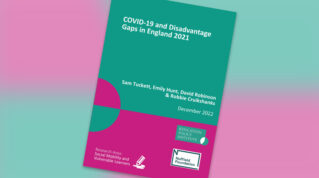College staff absences have spiked since the start of term, but despite the shortages, there appears to have been no major disruption to January exams.
Where challenges have arisen, staff are working extra hours, with managers stepping in to help invigilate vocational and technical qualifications (VTQs) this month.
Some colleges believe there should be an additional exam series in March to help those learners having to defer tests until the summer due to catching Covid.
The Department for Education’s latest attendance survey data estimates that one in 25, or four per cent, of FE college teachers and leaders were off on January 6 because of Covid. The figure for support and other staff sat at 3.4 per cent.
This is up from 1.6 per cent of teachers and leaders and 1.2 per cent of other staff on December 15, increases of 150 per cent and 183 per cent respectively.
Geoff Barton, leader of the Association of School and College Leaders, said “any hope” the Christmas holidays would act as a firebreak for schools and colleges “have evaporated”.
“The challenges posed by having so many staff absent will continue to put schools and colleges under severe pressure.”
It comes as about 300,000 learners sit exams each January, with exam boards having flexibility to bring in adaptations this year because of Covid disruption.
FE Week approached ten of the largest colleges to ask whether they had faced problems and how they worked to overcome them. Of those who responded, four said plans were going smoothly.
However, Stuart Rimmer, chief executive at East Coast College, said their usual bank of invigilators had shrunk for the 1,500 VTQ exams they’re putting on this month. This was in part due to current Covid rates, but also because of staff retiring or taking extra precautions against infection.
He said: “The staff have been absolutely amazing, whether that’s short-term cover work or doing extra hours or working on days they wouldn’t normally or stepping in to invigilate. We’ve had to deploy teachers and managers to invigilate some of these exams.”
Earlier this week, nearly 40 out of 550 staff (seven per cent) were absent, with 25 of these testing positive for Covid, Rimmer added.
Ofqual’s framework this year allows exam boards to make adaptations to take into account the disruption students have faced. But it’s up to each awarding organisation to make its own choice.
Pearson, for example, has extended the assessment window and delayed the start of the series by a week, to allow more time for teaching.
HCUC, in Uxbridge, said its 4,825 January exams are a “major logistical challenge” and had created “emergency invigilation schedules” due to staff absences.
A spokesperson said this schedule extends to senior management as well as external invigilators, which has extra costs and training time implications.
The college’s usual staff absence rate at this time of year (five per cent) has risen to 18 per cent because of sickness and self-isolation. A spokesperson commended all teams for their “commitment and creativity”.
However, a spokesperson said a March 2022 re-sit series should take place before the summer to prevent potential student disadvantage if they have had to isolate this January.
A spokesperson added: “Without a March exam sitting, students will only have a June sitting and no re-sit opportunity. Many are on a one-year programme and cannot defer exam re-sits to a second year.”
Meanwhile, independent training providers’ January exams appear to be largely unscathed, although their staff absence rates are not published by the DfE.
Simon Ashton, an assistant principal with Nacro, said it has fewer than 50 students taking exams, with only one deferral to the summer so far. But the staff absences are hitting its day-to-day operations, such as not being able to run some practical classes because there are not enough supervisors. Several of its 14 sites had staff levels of below 50 per cent over the last month.
“We’ve had to be resilient and make the best of it,” Ashton said. “We’ve had to combine classes, and managers have had to step in to help run classes to ensure learners still get a face-to-face session.
“But, for example, in motor vehicle classes, we’ve had to move to more theory-based work with the staff that we’ve got.”
There will be a focus on practical catch-up as part of the government’s 16-to-19 tuition fund, he added.

















Your thoughts